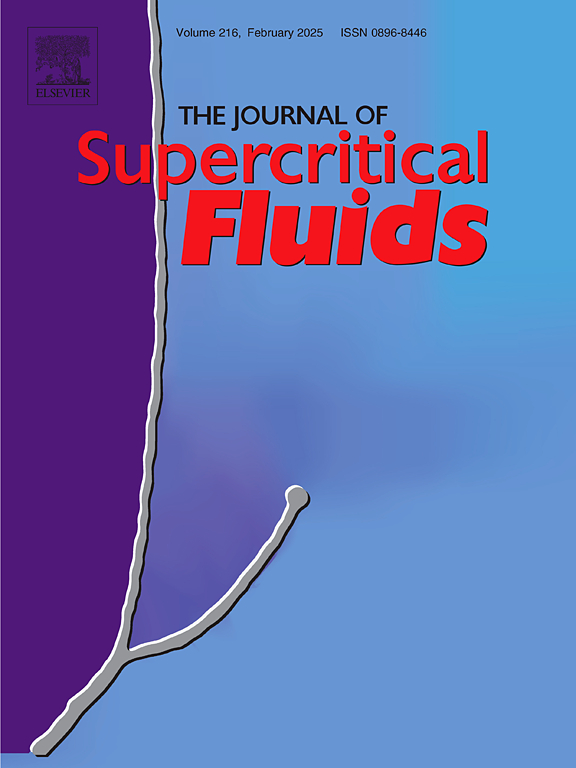Response surface optimization for supercritical carbon dioxide extraction of Korarima (Aframomum corrorima) seed oil and its antibacterial activity evaluation
IF 4.4
3区 工程技术
Q2 CHEMISTRY, PHYSICAL
引用次数: 0
Abstract
Oils extracted from natural plants are valuable resources because of their diverse biocidal activity against microorganisms. This paper reports, for the first time, supercritical CO2 extraction of oil from Korarima (Aframomum corrorima) seeds and its antibacterial activity evaluation. The influences of pressure, temperature, and extraction time on the yield of supercritical CO2-extracted oil (scCO2-extracted oil) were optimized using the Response Surface Methodology. Under the optimal extraction conditions of 46 °C, 15.5 MPa, and 147 min, the extraction yield reached 1.60±0.04 %, consistent with the theoretical value of 1.58 %. The compositions of the scCO2-extracted oil were identified by GC-MS, primarily consisting of nerolidol (33.97–41.20 %), geraniol (23.08–24.50 %), and α-terpinene (8.90–9.06 %). The oil exhibited significant antibacterial activity against Staphylococcus. aureus with a minimum inhibitory concentration of 1 mg·mL−1. This study highlights the potential applications of supercritical CO2 extraction technology for extracting Korarima seed oil and its use as an antibacterial ingredient in cosmetics and pharmaceuticals.
超临界二氧化碳萃取科拉利马(Aframomum corrorima)种子油及其抗菌活性评价的响应面优化
从天然植物中萃取的油具有多种抗微生物的杀菌活性,因此是一种宝贵的资源。本文首次报道了超临界二氧化碳萃取Korarima(Aframomum corrorima)种子油及其抗菌活性评价。采用响应面法优化了压力、温度和萃取时间对超临界二氧化碳萃取油(scCO2-萃取油)产量的影响。在 46 °C、15.5 兆帕、147 分钟的最佳萃取条件下,萃取率达到 1.60±0.04 %,与理论值 1.58 % 一致。经 GC-MS 鉴定,scCO2 萃取油的成分主要包括橙花叔醇(33.97-41.20 %)、香叶醇(23.08-24.50 %)和α-萜品烯(8.90-9.06 %)。这种精油对金黄色葡萄球菌具有明显的抗菌活性,最低抑菌浓度为 1 毫克/毫升-1。这项研究强调了超临界 CO2 萃取技术在萃取 Korarima 种子油以及将其用作化妆品和药品中的抗菌成分方面的潜在应用。
本文章由计算机程序翻译,如有差异,请以英文原文为准。
求助全文
约1分钟内获得全文
求助全文
来源期刊

Journal of Supercritical Fluids
工程技术-工程:化工
CiteScore
7.60
自引率
10.30%
发文量
236
审稿时长
56 days
期刊介绍:
The Journal of Supercritical Fluids is an international journal devoted to the fundamental and applied aspects of supercritical fluids and processes. Its aim is to provide a focused platform for academic and industrial researchers to report their findings and to have ready access to the advances in this rapidly growing field. Its coverage is multidisciplinary and includes both basic and applied topics.
Thermodynamics and phase equilibria, reaction kinetics and rate processes, thermal and transport properties, and all topics related to processing such as separations (extraction, fractionation, purification, chromatography) nucleation and impregnation are within the scope. Accounts of specific engineering applications such as those encountered in food, fuel, natural products, minerals, pharmaceuticals and polymer industries are included. Topics related to high pressure equipment design, analytical techniques, sensors, and process control methodologies are also within the scope of the journal.
 求助内容:
求助内容: 应助结果提醒方式:
应助结果提醒方式:


